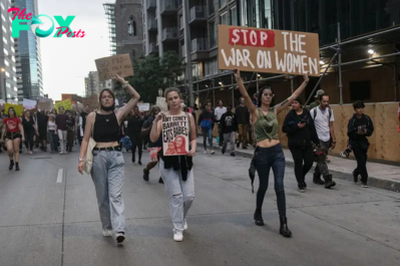Health
Colorado Springs cracks down on homeless camping in hopes of pushing people toward shelter, services
COLORADO SPRINGS — Jeremy Krause has a simple code for making it on the streets of Colorado Springs: “Stay dry and avoid the cops.”
To keep warm, he burns hand sanitizer and rubbing alcohol. To steer clear of the police, he and his dog move often.
But avoiding them is not working as well anymore.
“It wasn’t so bad in the beginning, but the last two years they’ve been really irrational,” said Krause, who has been homeless for about eight years. “They’ve stolen my things like six times. They take your tent, your blankets, your heat, everything you need to survive. That’s to force us into the shelter.”
That’s pretty much the strategy, local officials acknowledge. This is the “tough love” approach in Colorado Springs, where local law enforcement has intensified efforts in the past three years to push people into shelter beds that regularly sit empty. The proof is in the citations issued for illegal camping in public areas or for trespassing on private property, including land owned by the railroad or utility companies.
In 2023, Colorado Springs police issued 899 tickets to people who were homeless — 600 for trespassing on private property, 117 for illegal camping in public spaces and 182 for camping within 100 feet of a waterway.

Up the highway in Denver, a city not quite twice the size, here’s how many illegal camping citations the Denver Police Department wrote last year: 14. And that was up substantially from 2022, when Denver police wrote just one illegal camping ticket.
“We are going to enforce the laws, otherwise we will become a very trashy city,” said Colorado Springs Police Sgt. Olav Chaney, who supervises a team of six officers who are cracking down on illegal camping. “We hold people accountable is what it comes down to.”
Denver has nearly 4 times as many people sleeping outside
What Colorado Springs doesn’t want to look like is Portland or Seattle. Or Denver. And while encampments pop up along creeks, alleys and parks, Colorado’s second-largest city does not have sidewalks lined with tents for weeks or months at a time, as has been the case around downtown Denver, especially since the coronavirus pandemic began in 2020.
Homeless crisis: Key differences between
Denver and Colorado Springs
Latest point-in-time homeless count
Denver County
3,352 in shelters
1,423 outside
El Paso County
928 in shelters
374 outside
How long does each city give notice before cleaning up encampments?
Denver
7 days
Colorado Springs
24 hours (or less)
Citations issued in 2023 for either illegal camping or trespassing
Denver
14
Colorado Springs
899
The latest “point-in-time” count of people who were homeless in El Paso County found 928 people in shelters and 374 outside, compared with 3,352 in shelters in Denver County and 1,423 outside. And while Denver has temporarily housed and fed nearly 40,000 migrants from South America over the past year, Colorado Springs counts just 24 families who stayed at a local Salvation Army shelter.
For Chaney, those numbers are related.
“We enforce our laws here in this city,” the police sergeant said. “That’s a big difference, too.”
The sergeant said he recently ran into four people camping under a road in Colorado Springs who said they had come down from Denver. “Just so you know,” he recalled telling them, “you have one hour to vacate because you are right in the middle of a stream here.”
“To a T they said, we are going back to Denver. We were OK with that. Just know that if you are going to come into this beautiful city of ours, we will enforce our laws.”

Colorado Springs is not just handing out tickets, Chaney said, but working to close what he called the “revolving door” — the folks who are ticketed for illegal camping, then don’t show up for court, then have a warrant out for their arrest, then end up in jail for a few days, then get out and set up an illegal campsite. The goal is to push them into shelters, drug and alcohol rehab centers or wherever they need to go to get off the streets.
“We take a stance because it’s the same people over and over again,” Chaney said. “They are the ones that let drug issues overtake them, which is sad in itself. We have the resources available to these folks who refuse to take the resources. Every time we contact these folks, the minute they say they are ready to go into rehab, or these services, we will drive them there. If somebody says, “I’m ready to go get help,’ I’m not even going to worry about tickets.”
There’s no reason people need to sleep outside — the city has plenty of shelter beds, he said. On average, about 200 shelter beds go unused every night in Colorado Springs, said Chaney, who receives a daily update from the Springs Rescue Mission. According to a 2023 count, 2,162 formerly homeless people were living in permanent housing.
While Denver posts seven days’ notice before city crews clean up an encampment, Colorado Springs gives 24 hours. And if the tent is on private property or within 100 feet of a waterway, which includes Fountain Creek or any other creek or drainage ditch, the notice is just one hour. Colorado Springs enacted the waterway ordinance about five years ago.
From outreach to enforcement
Homeless residents even get tickets for camping within 100 feet of dry creek beds, said Jansen Howard, manager of the outreach program for Homeward Pikes Peak, which provides housing, mental health care and substance use treatment. The fine is $1,500, which “obviously they can’t pay,” she said. “It’s just an endless cycle.”
-

 Health8h ago
Health8h agoThe Surprising Benefits of Talking Out Loud to Yourself
-

 Health10h ago
Health10h agoDoctor’s bills often come with sticker shock for patients − but health insurance could be reinvented to provide costs upfront
-

 Health1d ago
Health1d agoWhat an HPV Diagnosis Really Means
-

 Health1d ago
Health1d agoThere’s an E. Coli Outbreak in Organic Carrots
-

 Health2d ago
Health2d agoCOVID-19’s Surprising Effect on Cancer
-

 Health3d ago
Health3d agoWhat to Know About How Lupus Affects Weight
-

 Health5d ago
Health5d agoPeople Aren’t Sure About Having Kids. She Helps Them Decide
-

 Health5d ago
Health5d agoFYI: People Don’t Like When You Abbreviate Texts


























